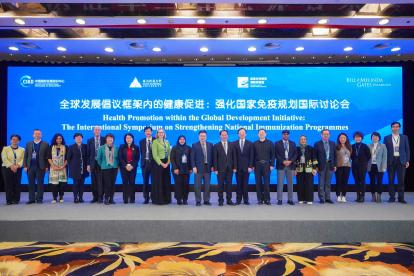
A patient receives a human papillomavirus (HPV) vaccine at a health center in the Inner Mongolia region of China, in 2022. Photo by Xiaolu Chu, courtesy of The Bill & Melinda Gates Foundation
Published November 17, 2025, last updated on November 18, 2025 under Research News
China’s addition of the vaccine for human papillomavirus (HPV) to its national immunization program is being hailed as “a milestone in protecting women’s health,” marking a critical step in global efforts to eliminate cervical cancer. But the landmark change, announced on Nov. 10 at a joint conference of Chinese national ministries, also represents a gratifying victory for a team of researchers at Duke and Duke Kunshan University.

The Innovation Lab for Vaccine Delivery Research (VaxLab), housed at DKU and involving several researchers with the Duke GlobalHealth Institute, has been working since 2021 to make a case for expansion of China’s immunization program. Led by Shenglan Tang, M.D., Ph.D., a global health professor with joint appointments at DGHI and DKU, VaxLab has published multiple reports detailing the advantages of including HPV vaccines, along with three other vaccines deemed essential by the World Health Organization, in China’s program, which sets standards for childhood immunizations routinely given across the country.
China’s new policy, the first significant change to its national immunization program since 2008, ensures that girls can receive free HPV vaccines once they turn 13. HPV infection is the predominat cause of cervical cancer, the fourth most common cancer among women worldwide. China accounts for around 17 percent of deaths from cervical cancer globally.
“The day has finally arrived,” said Tang, who has worked for the past three decades to expand vaccine access and improve public health policies around vaccine-preventable diseases in China and other Asian countries. Tang noted the VaxLab team was among several groups working with Chinese health officials to pave the way for the policy change and work out technical details around its implementation. “We are honored to contribute.”
China’s national immunization program provides free access to 14 vaccines, offering wide-scale protection against common infectious diseases such as hepatitis, measles and polio. While Chinese citizens have had the option to pay out-of-pocket for HPV vaccines, lack of government funding creates significant disparities in vaccine access, Tang said.
“From a public health perspective, disease prevention is essential, and vaccines are a way to spend resources where they have the greatest impact,” he said.
Prior to establishment of its national immunization program in 1978, for example, China saw more than 9 million cases of measles annually, killing around 260,000 children each year. With wider access to measles vaccines, cases have since plummeted to fewer than 4,000 per year. Similarly, the addition of hepatitis B vaccines to national immunization campaigns in 2002 is estimated to have prevented nearly 30 million children from developing the disease.
Over the past four years, VaxLab and its partner institutions have published 18 research studies related to adding HPV and other essential vaccines to China’s national immunization program, exploring issues such as financing, vaccine access and equity, and the public health benefits that would flow from expansion. According to one modeling study, routine HPV vaccination for girls beginning at age nine, along with other public health measures, could help China eliminate cervical cancer by 2047.
For more on how the VaxLab's research has influenced China's national vaccine policy, see this report from the VaxLab and this in-depth history (in Mandarin) from DKU's news office.

VaxLab researchers and collaborators at...


